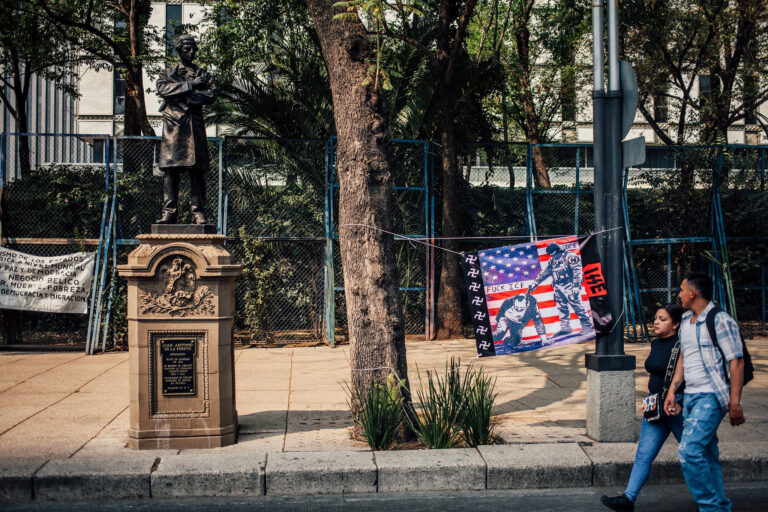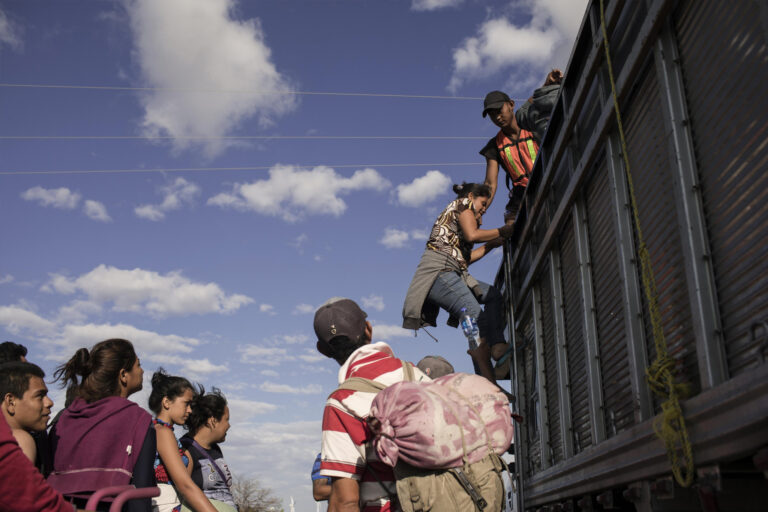A POOR ELECTION, A BETTER PURGE
Yesterday marked a significant and historical moment in the circuitous advance of Mexican popular democracy: nearly 100 million eligible Mexican voters were, for the first time, able to directly elect almost every single member of the judiciary, from magistrates and district judges to the Supreme Court. Despite decades of PRI degeneracy followed by neoliberal barbarism, some of the popular, social spirit of the Mexican Revolution and its progressive Constitution of 1917 appear to be alive.
Mexican citizens analyzed 3,422 candidates and in the end, elected nine justices of the Supreme Court of Justice of the Nation; two seats on the Superior Chamber of the Electoral Tribunal of the Federal Judiciary; 15 seats in Regional Chambers; five members of the Judicial Disciplinary Tribunal; 464 circuit magistrate positions; and 386 district judges.
The idea of a such a complete judicial election has much to recommend it in a country with a dysfunctional, corrupt judiciary, but also the particulars of the process, with attempts to limit the intrusion of economic powers in the election: advertising was banned, there was no party representation, the rules mandated equal access to radio and television for candidates. The election will also ensure gender parity in the courts, part of the country’s commitment to gender equity, at least politically: Mexico is one of the few countries in the world which excels at women’s parliamentary representation, with over 50.2%, surpassed slightly by regional friends Nicaragua at 55% and Cuba at 55.7%. A sorely needed judicial disciplinary tribunal was elected: sorely needed in a country where the judiciary gleefully freed criminals, both organized, domestic and corporate, international.

The judicial election also scared the right people, not just Oxbridge toffs at The Economist (“bad for governance and good for gangs”), the New York Times (“we don’t have kings in democracies,”), but on the day of the election, a dire warning from CNN commentator and saffron, white & green diaper baby Fareed Zakaria (son of Indian National Congress’ MP and diplomat Rafiq Zakaria), who spent a good part of the 1980s at Yale defending South Africa’s racist apartheid system. Zakaria scorned Sheinbaum for her populist pandering in his video montage, as footage of Netanyahu, Modi, Erdogan, and Trump rolled across the screen; but his message was more pearl-clutching from credentialed elite than Marx’s The Eighteenth Brumaire of Louis Bonaparte, ending with a quote by David Frum’s favourite Mexican political commentator and clown-canoodler Denise Dresser, stating this election was a “final nail in the coffin” for Mexican democracy.
By any standards, the Mexican judiciary is corrupt, out of touch, positively criminal: Sabina Berman in El Universal writes that two out of three Mexicans believe only one more figure is more unfair and corrupt than a Mexican judge: a police officer.
So far, so good for popular democracy, and a pre-election poll by Enkoll showed that 86% of the population was aware of the elections, while 38% of respondents planned to vote. This would be in line with Bolivia’s first judicial election in 2011. By 2017, the number of eligible participants was 42.1% and just last year, even in the context of the controlled demolition of the MAS-ISP by President Luis Arce and his conflict with the social movements and the left represented by Evo Morales, turnout of eligible voters was 64%.

Mexican President Claudia Sheinbaum, who carried out this first election that began in former President Andrés Manuel López Obrador’s final days, was cagey enough to answer that the election would be a success, as “millions will participate,” in a question about forecasts of low voter turnout. (Today, she said the number of people who participated was within what she estimated, and so it was “a good result.”)
And indeed, it appeared millions of eligible voters did vote, but not in percentages that could be considered high, nor comparable to Bolivia’s judicial elections, and sadly, not even comparable to US judicial elections, where about 20% of eligible voters participate.
Last night, Guadalupe Taddei, president of the National Electoral Institute, announced that eligible voter participation was estimated to be between 12.57% and 13.32%, based on a random sample of 1,644 polling stations. (The actual participation rate is still being calculated along with the results, we also don’t yet know how many voters voided their ballots)
(As has been pointed out elsewhere, even with a low-turnout, more people than ever before in Mexico’s history have participated in the selection of the judiciary. In 1995, President Ernest Zedillo fired and replaced the entire Supreme Court. Incredibly, he’s now shrieking about Mexico’s descent into tyranny from Yale.)

There were predictably many issues with the election, as identified in a pre-election roundtable featuring journalists Alina Duarte, Daniela Barragán, Perla Velázquez and Meme Yamel: the novelty of the election, a hostile corporate press which still dominates the information sphere in the country, major figures calling for a boycott, voter mobilization campaigns focused almost totally on electronic media, thin information about the candidates (in my neighbourhood in southern Mexico City, candidate campaign literature was almost uniformly along the lines of, “I graduated from UNAM, I like human rights”), the staggering amount of candidates (a family member told me there 500 candidates, so she only voted on one out of six ballots owhere she recognized any names, and voided the others).
Citing budget restrictions, the INE opened only half the polling stations of Mexico’s 2024 election, where voters had many less candidates to elect.
But there’s also the class issue. Depending on who is asked, President Sheinbaum’s extended timeline to reduce the workweek to 40 hours (from its current hideous 48 hours) by 2030 is either a tactical maneuver to keep her powder dry for future confrontations with Mexico’s vindictive bourgeoisie, a principled commitment to trilateral dialogue, or a revealing capitulation to the power of finance capital. Whatever the case, can we honestly say the average Mexican worker, nevermind a working parent, with a 48 hour work-week, and a 4-hour daily commute has the time to study the profiles of almost 300 judicial candidates online and make informed choices?
The right to elect judges without the ability to properly exercise it, with enough time to make an informed choice, diminishes the democratic substance of that right.
So Mexicans were very much in favour of the judicial elections, but did not turn-out en masse, both by choice and poor construction, but will still likely be satisfied with them. Why?

I think these elections can be regarded less as elections, than as a successful and peaceful purge of an obstinate bureaucracy by an ostensibly left wing government. In a country that has seen more than its share of political violence (including in the previous election, and just weeks earlier in Mexico City, when two high-level staff members of city head of government Clara Brugada were murdered in the daylight on a busy street in the center of the city) and criminal violence, sweeping out an entrenched bureaucracy characterized by nepotism, impunity, slush-funds, criminal ties, and corporate collusion.
Whether Morena leadership, currently shooting itself in the face by making grimey pacts with fiscally incompetent gangsters and more committed to declaring the end of neoliberalism than actually ending some of its most egregious aspects (such as re-socializing Mexico’s privatized pension system, where right wing Ricardo Salinas Pliegos manages the retirement pensions of over 16 million Mexicans but refuses to pay billions in pesos in taxes) actually wants an ethical judiciary is sadly, an open question, but by September, Mexico’s judiciary will at least begin with a fresh slate and oversight.
To accompany that new judiciary, Mexico will soon have a new telecommunications law which could socialize some areas of public discourse. Morena has a cranky base asking questions about the ‘excessive pragmatism’ and queue-hopping by chapulines. This month we’ve seen the CNTE, a radical labour union, leading a national strike shut down Mexico City’s major airport and thoroughfares. The contradictions of the economic model of nearshoring and a burgeoning welfare state are being exacerbated by US President Trump’s tariff war and imperialist fuckery, hastening their resolution; a right wing opposition thankfully cannot find its footing, China and CELAC are deepening their relationship, and we’re all waiting to see what happens next.
-
CNTE Announces 72 Hour National Strike & March to Mexico City’s Zócalo
The class-conscious teachers union will also make “courtesy visits” to the embassies of countries who committed atrocities against Iran, to show their rejection of US imperialism.
-
Yet Another Mexican Citizen Dies in ICE Custody
The unidentified victim is the 9th Mexican citizen to have been killed in ICE detention since the beginning of 2025; this time in Adelanto, California.
-
Let’s Talk About Migration: Trumpist Persection
Millions of women who have endured unspeakable violence on their migration journey are now being persecuted in the United States by an extremely xenophobic and misogynistic government, led by Donald Trump,




